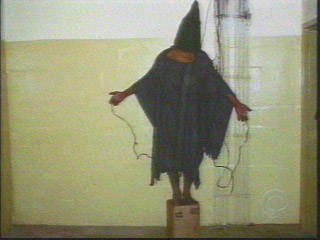President Barack Obama received a great deal of media attention on Wednesday for signing a historic hate-crimes bill into law. But, on the same day, the US president also signed a Homeland Security spending bill that received far less attention, even though it effectively blocks efforts by activists to reveal photos of detainee abuse in US custody.
“We are disappointed that the president has signed a law giving the Defense Department the authority to hide evidence of its own misconduct, and we hope the defense secretary will not take advantage of that authority by suppressing photos related to the abuse of prisoners,” Jameel Jaffer, national security director for the ACLU, said in a statement.
Earlier this month, the House and Senate inserted language into the Homeland Security appropriations bill that would shield photos of detainees in the US’s war on terror from the Freedom of Information Act. The language, which was added at the prodding of Sen. Joe Lieberman (I-CT), effectively blocks an ACLU lawsuit currently before the courts that would have forced the government to release the photos under Freedom of Information statutes.
As Daphne Eviatar noted at the Washington Independent, “President Obama initially agreed to release the photos, but changed his mind after consulting with Defense Secretary Robert Gates and others at the Pentagon, who warned the photos would endanger US servicemen in Iraq and Afghanistan.”
At issue are 21 photos of detainees in US custody that the Department of Defense has been fighting tooth and nail from releasing. As Raw Story reported earlier this year, those photos may show acts of sexual abuse being carried out against detainees.
Major General Antonio Taguba, the author of a report on allegations of detainee abuse in U.S. prisons in Iraq, said that photos exist depicting the following:
–An American soldier apparently raping a female prisoner.
–A male translator apparently raping a male detainee.
–A female prisoner having her clothing forcibly removed to expose her breasts.
Other photographs depict sexual assaults on prisoners with a truncheon, wire and a phosphorescent tube, according to Taguba.
TRANSFER OF GITMO PRISONERS NOW LEGAL
However, there was some good news for human-rights advocates in the Homeland Security bill. Another provision in the law allows for the transfer of detainees from Guantanamo Bay to US soil for trial.
“The administration should now do exactly that,” the ACLU’s Jaffer said. “The military commissions at Guantanamo are not just unlawful but unnecessary. The federal courts are fully capable of prosecuting terrorism suspects while protecting both national security interests and fundamental due process.”
President Obama made closing the detention facility for terrorism suspects in Guantanamo Bay a cornerstone of his electoral campaign. Since coming into office, the president has struggled to make good on the promise, slowly shifting detainees out of the facility whenever possible, and facing opposition to the idea that prisoners should be tried in the US from political opponents concerned about national security.
MORE TORTURE DOCS MAY ARRIVE FRIDAY: MOTHER JONES
Some 224 documents related to the Bush administration’s “enhanced interrogation techniques” could be released by the government as early as Friday, says a report at Mother Jones magazine. Among those documents could be a 59-page, 2002 top secret memo from the Pentagon detailing torture techniques.
The Obama administration had intitially believed the documents could be kept from the public under current laws, but upon closer inspection, found that Freedom of Information laws could apply to them, reports Nick Baumann.
However, as Baumann noted, the documents could still be blocked from release — ironically, by the person appointed to look into criminal prosecution of CIA torturers. John Durham, the special prosecutor appointed by Attorney General Eric Holder this summer to investigate abuses in the CIA’s interrogation program, “could conceivably preempt the release of any documents.”
Baumann reported:
In a filing last week in a related case, government lawyers said that Durham was claiming that the release of certain documents could interfere with his investigation and were off-limits. If Durham attempts to block the release of these documents, a court would have to decide whether his assertion of privilege was justified.
By Daniel Tencer
Thursday, October 29th, 2009 — 8:06 pm
Source: The Raw Story
